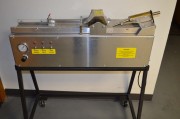
- Unpack the dust feeder.
- Plug in the electrical line to standard 220-240 VAC outlet.
- Note that the feeder tray slides freely on two nylon rails when the vertical lever pin is disengaged (lifted up) from the feeding chain.
- Set the tray in position by inserting (push down) vertical lever pin between two links on the feeding chain at approx. 3 inch or more forward of the sprocket that turns the chain.
- Since the dust will be spread evenly across the width of the tray, and the tray advances ~28 cm (~11”) in 10 minutes, it is necessary to mark on the tray where the dust will be placed; make a mark on one edge of the tray that rides on a nylon bar near the paddle wheel – designate this as the starting point (0) for dust placement. Turn on the tray feed toggle, allow 10 minutes for the tray to advance, then mark the tray again – about 28 cm back from the staring point - designate this as the stopping point (10) for dust placement.
- Supply an air pressure line (720 Kpa max) to the air inlet fitting (1/4 FPT) located on the side of the unit. Option: it may be desirable to connect a standard shut-off valve and/or a quick-disconnect fitting(s) at this air inlet for convenience.
- Dry-run the unit without dust on tray to check unit operation: with electricity & 700 Kpa at air inlet, turn on toggle switches first for TRAY FEED, then PADDLE WHEEL, then ASPIRATOR, and ascertain that tray moves slowly, paddle wheel rotates with wheel guard down, and that forced air comes out of the delivery tube.
OPERATION
- Set the line pressure to 600 Kpa (for ASHRAE usage the airflow is 14.5 scfm and pressure should be set accordingly to achieve this flow rate). Refer to section 5.4 in the ASHRAE 52.1 procedures.
- Connect the air outlet of the delivery tube to your test air duct.
- Weigh out and apply ASHRAE 52.1 dust in the tray and distribute the dust in a thin, evenly-spread layer between the two start/stop marks (0 and 10 min.) on the tray. Depending on the flow rate of the filter under test, the amount of dust needed equates to 2 grams of dust per 1000 cfm of air flow in the duct per minute of dust feed.